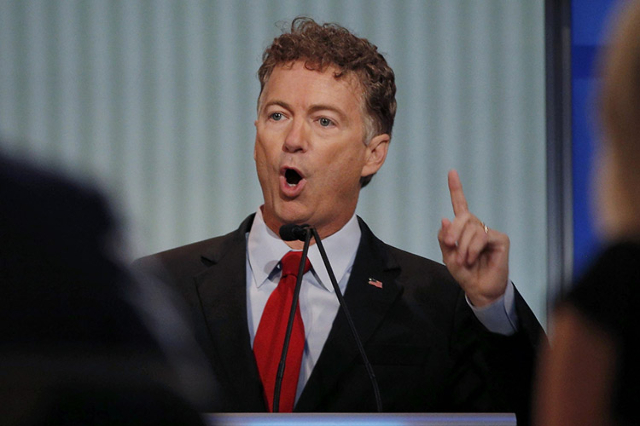Rand Paul’s consistency key to his political life
A foolish consistency may be the hobgoblin of little minds, but it's also the animating principle behind Kentucky Sen. Rand Paul's political life.
That's in part what allows Paul to stand outside the usual left-right political spectrum — his slogan includes the phrase "defeat the Washington machine," after all. And when it comes to assigning blame for what Paul sees as the problems in politics, he's certainly no party hack.
Paul says Republicans are part of the problem with their eagerness to spend money on national defense projects, every bit as much as Democrats are at fault for social welfare spending. And when it comes to making real budget cuts, Republicans and Democrats are eager partners in avoiding the pain, Paul said at the grand opening of his Las Vegas office on Monday.
"People say there's too much acrimony in politics," Paul said. "It's actually the opposite. They get along too well together."
Now that's the kind of observation you don't hear too often, and it's due in part to Paul's uniqueness. The son of famous Texas Rep. Ron Paul, who embodied libertarianism so much that the elder Paul ran for president on the Libertarian ticket in 1988, Rand Paul exemplifies that movement's unconventional thinking.
"Do we want to be the party that's less bad?" Paul asked a healthy crowd of supporters outside his new campaign office.
Paul's outsider streak is also why he can say this: "I will come up with a bold statement in Boulder [site of tonight's CNBC-sponsored Republican debate]. And that is: I am the only fiscal conservative" in the race.
Really? The only fiscal conservative? Isn't, say, Texas Sen. Ted Cruz a fiscal conservative? Asked that very question, Paul slyly dissed two opponents with his answer: Cruz voted for a bill introduced by Florida Sen. Marco Rubio this year that would have increased military spending by $190 billion without offsetting that spending with cuts elsewhere.
See what he means about Democrats and Republicans?
And Paul was not silent on the issue at the time, either, calling Rubio's approach "reckless" and "irresponsible," especially because it relied on borrowing.
Just days later, however, Paul himself proposed a $76.5 billion increase in military spending — only his increase would have been paid for by cutting aid to foreign governments, reducing climate change research and cutting the budgets of the EPA and the Departments of Housing and Urban Development, Commerce and Education, according to Time magazine.
Consistent, at least.
To be sure, Paul is given to the anti-government bromides common to the GOP primary field that are candy for the base.
"I'm running for president because I believe that government governs best which governs least," he said, quoting Thomas Jefferson.
Or this: The bigger the government, the less the liberty.
Or this: "I want a government that's so small I forget it's there."
But that's not the kind of government that re-engineered industrial production, trained millions of new soldiers and traveled across the globe to win World War II. It's not the government that created the interstate highway system, or Social Security, the most successful social welfare program in human history. It's not the kind of government that planned and executed a manned moon landing in the space of a decade. And it's not the government that will someday help find a cure for cancer, new ways to generate clean energy or journey to Mars to check out that planet's water firsthand.
Yes, sometimes the government wastes money, makes mistakes, goes overboard or does downright stupid things that make us all angry. But not all the time. Unlike Rand Paul, not everything that happens in government is consistent.
— Steve Sebelius is a Las Vegas Review-Journal political columnist and co-host of the show PoliticsNOW, airing at 5:30 p.m. Sundays on 8NewsNow. Follow him on Twitter (@SteveSebelius) or reach him at 702-387-5276 or ssebelius@reviewjournal.com.




























